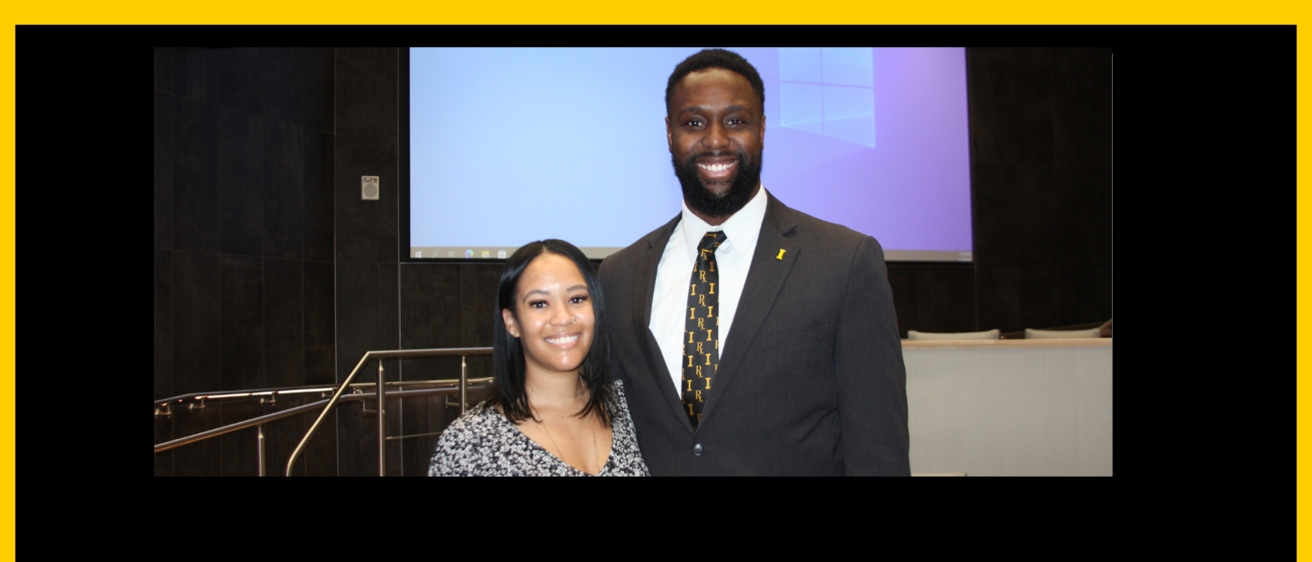The community pharmacist is the pillar of a town, neighborhood, suburb, or village. Ask them about their role and they’ll explain how they love serving others. Visit with the residents they counsel, and you’ll hear how much their pharmacist is a valued.
Robert Nichols, ’17 PharmD, ’18 R, and Chayla Morris, ’16 PharmD, ’17 R, recently visited with faculty, staff, and students about the importance of community service. Nichols is a pharmacist at Greenwood Pharmacy in Waterloo, Iowa, and an at-large city council member. Morris is the clinical pharmacy coordinator for Broadlawns Medical Center in Des Moines, Iowa.
Importance of a Community Pharmacist
Beyond prescriptions, a pharmacist can be a rock for a community. “Service to community is emphasized at the UI,” said Nichols. “One leader, Bob Osterhaus (’52 BSPh) said ‘the best way to get to know your community is to be engaged in your community.’ That really stuck with me.”
Morris added that talking with patients is what makes a pharmacist’s job. “People tell us their problems,” she said. “We can have an impact and teach others about culture. We have to look at not just medications but the person.”

While Morris was working as a clinical pharmacist at Ochsner Health in New Orleans, COVID-19 restrictions meant patients couldn’t see their primary care physician, this made their pharmacist all the more important.
“I felt like I built great relationships with patients during that time,” said Morris. “One woman had high blood pressure, but the more I talked with her I realized there was something else going on and referred her to behavioral health where she got the help she needed. I also had patients who loved the food during Mardi Gras but had high cholesterol. The more you can learn about a community or culture and communicate with your patient, the better you can empathize and compromise so they can do what gives them joy and still get better health wise. It’s about balance.”
Nichols noted he has used smartphone translation tools to better communicate with refugee communities. “Pharmacists have to engage to learn what these communities care about to be as informed as possible when interacting with them,” he said.
Ways to Get Involved in the Community
The little things can have such a big impact, when it comes to community involvement – a little time, a little money. The simplicity of showing up and being present to hear the needs of patients so they know they’re heard is significant. For Nichols, his residency at Greenwood Pharmacy helped him learn that.
“Service to community is emphasized at the UI (College of Pharmacy). One leader, Bob Osterhaus (’52 BSPh) said ‘the best way to get to know your community is to be engaged in your community.’ That really stuck with me.” -Robert Nichols
“It allowed me the flexibility and autonomy to dream big,” he said. “Specifically, the bane of community pharmacy has been not having access to patient charts. It was a real deficiency. During my residency, I worked with a group and was able to build transitional care – workflow, policies and procedures, and more – simply by showing up to a meeting and volunteering,” Nichols said. “I raised my hand to look into how this might be improved. I learned what happens during a transitional care encounter and met with technology people and others. Eventually I said, why don’t we just give pharmacies read-only access to Epic (an electronic health records system).”

Because he was encouraged to follow his interests and stepped up to volunteer, subsequent Greenwood residents were able to evaluate how his work influenced patient readmission rates, recognize gaps – such as skilled nursing and behavioral health – and engage providers to fill those. This helped build the level of care the pharmacy offers patients, including helping them make better decisions.
Engaging with community starts during pharmacy school.
“When I first got to the UI, I wasn’t very involved,” said Nichols. “Student organizations are great, and they help your career so much. You get to meet people. I encourage students to get involved at the regional and national level. People are enthusiastic about moving the profession forward. If you want your ideal job when you get out of school, take advantage of networking opportunities with people who were in your place at one point.”
He added that because the state of Iowa is so collaborative and has a single pharmacy association, it makes it easy to participate in initiatives, share ideas, and have interactions.
“The annual Iowa Pharmacy Association meeting is like a family reunion. Everyone is collaborative, engaging, and supportive,” he said.
Morris echoed those sentiments.
“My pharmacy journey wouldn’t have been the same if I hadn’t gone to Iowa. Faculty always encouraged us to be independent and think about how we would do something as a pharmacist,” she said. “I felt like I was supported and not in competition with other students. So many in (the state) truly want the industry to move forward.
My residency experience (at CarePro Health Services in Mount Vernon, Iowa) was incredibly important for my journey through pharmacy to where I am now. I used a drug adherence tool to interview patients and identify barriers to medication and create interventions," continued Morris. “I got to work on my communication skills. I then became interested in the billing side of pharmacy and started tracking interventions, charges and reimbursements, which has helped me in my current role.”
At Broadlawns Medical Center, Morris serves on committees working to build Ambulatory Care Services.
“I created a health ambassador program, working with local communities, about hypertension and provided tools to help, such as blood pressure monitors,” she said. “Through interactions in community meetings, I’ve been able to make a difference.”
“My pharmacy journey wouldn’t have been the same if I hadn’t gone to Iowa. Faculty always encouraged us to be independent." -Chayla Morris
